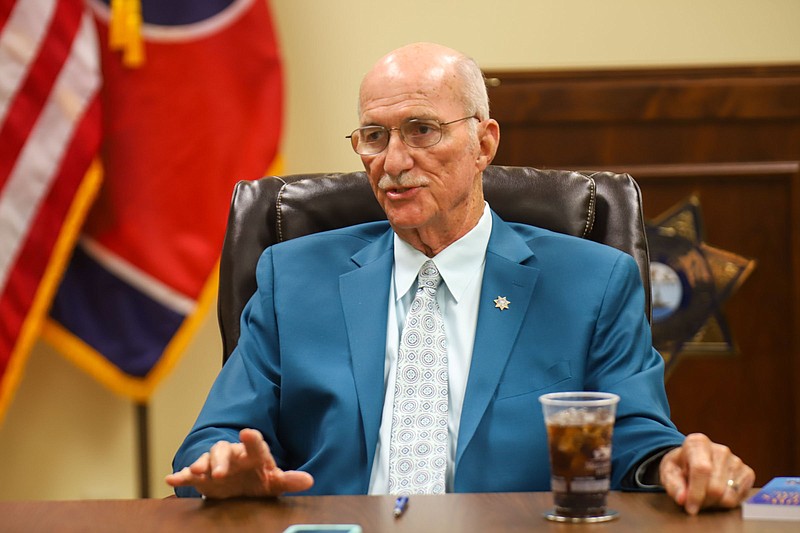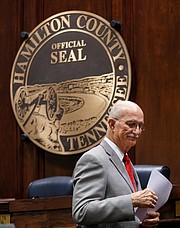Jim Hammond, retiring Wednesday after serving three terms as Hamilton County sheriff, began his career as a legal service officer in Juvenile Court in 1965. He was appointed as chief deputy by then-Sheriff H.Q. Evatt in 1978.
After working for Evatt for more than a decade, Hammond left the office for a time and got experience overseas, returning to Chattanooga in 2008 and winning a special election for sheriff.
While he was away, Hammond taught at the University of Tennessee in Knoxville as an adjunct professor of criminal justice. He then was appointed by the Department of Justice’s International Criminal Investigative Training Assistance Program in 1995 to train police officers in Haiti and the Middle East, according to a legislative resolution to honor the sheriff on his retirement.
After the indictment and arrest of former Sheriff Billy Long for extorting small-business owners through an illegal campaign contribution scheme, Hammond ran for sheriff and won. In 2018, Hammond appointed Austin Garrett as chief deputy and announced he would not be seeking a fourth term. Garrett ran unopposed for sheriff this year and will succeed Hammond on Thursday.
“He’s spent 50 years, roughly 50 years, just (in) public service, ranging from Juvenile Court to the U.S. Navy, chief deputy teaching abroad,” Garrett said by phone. “He’s invested so much into this community and, and society in general, that I hope he can rest … after that length of service and all he’s accomplished.”
In 2020, Hammond hired Coty Wamp as in-house legal counsel.
“Sheriff Hammond has been a legend in our community for more than three decades. His service is unparalleled, and his shoes will be difficult to fill,” Wamp said by text.
Wamp, who is gearing up for the next step in her career as the next district attorney for Hamilton County after winning the Aug. 4 general election, said Hammond’s legacy will live on past his retirement.
“As he enters retirement, his legacy continues through all of us that he influenced, especially our next sheriff and myself as district attorney,” Wamp said.
The Times Free Press recently sat down with Hammond to talk about his tenure at the office.
Q: Let’s start with your career as sheriff, you were appointed as chief deputy in 1978.
A: H.Q. Evatt asked me to be his chief deputy many years ago. I was at Juvenile Court at the beginning of my career. I went through the police academy, served as his chief deputy for about 17 years. When he retired, I ran for office and was beat by John Cupp, who served a couple of terms, part of which I was living in the Middle East working with the foreign police. He lost an election (in 2006) to Billy Long, but then (Long) screwed up and went to the penitentiary, so I came home just as that happened. When Billy Long messed up, that’s when the call came, “Hey, you need to you need run for sheriff,” and I’ve been sheriff ever since.
Q: What have been your most proud moments being a sheriff or what would you consider your biggest accomplishments?
A: In terms of the community at large, I had my whole adult professional life been in law enforcement, and this was kind of the pinnacle for me. Somebody asked me one time, if I had been given an offer to go to the state, would I have taken it, the answer would have been no, and I have to borrow a phrase from Sheriff Evatt. When I worked for him, he was asked to go up there, and he didn’t do it, and when I asked him why not, he said, “Jim, a sheriff is a big fish in a small pond in the county, at the state, he’s a small fish in a big pond.” He said, “I can have more influence in Hamilton County, for good law enforcement, than I could ever have working for the state,” and I thought that gave me the opportunity to be the best person I can be in Hamilton County. That means I’ve got to treat everybody the same. I’ve got to believe that no matter what a person’s race or ethnic background, or whether they’re a criminal or the best preacher in town, they deserve the same justice.
Q: What are your thoughts about the criticism you’ve received in the media?
A: In all fairness, I learned very long ago, I cannot let my feelings be on the surface. I have to make hard decisions, but I got to be able to make that decision. The number one thing people tell me was, “What we like about you most is you said what you meant and you meant what you said, you stuck with your guns,” and “if you were wrong, you’re willing to apologize If you felt right about it, you stuck with it.” I have tried to maintain that. I’ve gotten a lot of criticism, a lot of it I think was undue. There were times I made mistakes like anybody. Probably the biggest thing that’s happened to me is in regard to the ministers who protested so much, gets me the most. For instance, in the Blake Kilpatrick case, I refused to terminate him because due process had not taken place yet, and I explained it every time. If he was Black, if he’s white or Hispanic, I’m not going to terminate somebody who hadn’t had due process. If the due process comes out and says he’s guilty, I will fire him personally.
(As previously reported by the Times Free Press, Deputy Kilpatrick was under federal investigation after a Dec. 3, 2018, video showed him punching and kicking a handcuffed Black man. The man, Chattanooga rapper Charles Toney Jr., and his attorney filed a $250,000 lawsuit against the Sheriff’s Office and the county in December 2019. Commissioners and community members called for the termination of Kilpatrick. Hammond said he would only do so if the deputy were indicted. Kilpatrick was placed on paid administrative leave with pay after the video went viral, and he was later suspended in December 2021 pending the outcome of the federal investigation against him. He returned to work in February 2022 and has been promoted to sergeant.)
I had a man that had been off work for three years. I had a man that if people understood his background, he literally had African American children in his home as orphans. This man had not a racist bone in his body. This came down to one case, the guy that had all kinds of problems. It never came to court, so I put him back to work. I still got the criticism. I will say this, some of them — and I’m talking about African American preachers — some of them came to me and said, “Jim, we stayed out of it, because we agree with the first statement, you said, let due process take effect,” and I assured them I’d be the first one to fire him if he had been indicted, because the law says he can’t work for me while under indictment. So he would have been terminated if any of those agencies had moved forward with it. That’s probably the one that was the most harmful, in terms of a case.
Q: Throughout the course of your career, have you had any regrets or thought maybe there was something you could have done a little bit better?
A: My entire career, my biggest regret is I did not get to become a pilot. My dad was a pilot, and I wanted to follow him. And after three attempts to become a pilot, they finally said, “Look, you don’t even need to get on a passenger airplane, you don’t know enough about flying to ever be in an aircraft,” and that was a little demeaning, but at the same time, I thought, well, OK, what’s plan B? I went right across the hall to join the Navy. The complete opposite, but it opened doors to me. When I lost to John Cupp, which was pretty devastating to lose the race, whoever you are, I had no idea the doors that would open to me for international training and travel. I spent the next number of years training in foreign countries, things I would have never gotten to do if I’d won that election. It made me a better sheriff by having all that exposure to all those foreign police. So the Lord has a way of opening things for you.
Q: What is something that you wish people knew about you that they don’t know?
A: That I’m a great piano player. I’ve always had the dream of one day feeling comfortable enough to go into a sleazy little backroom bar and sit down at a jazz piano and just quietly play a little music. I actually learned to do that working the third shift in Juvenile Court because I’d have nothing to do after I checked everybody in and made sure they were in their cells. I could study because I was in university. Or I could sit down at an old upright piano that was there and pick little songs, but I realized that certain notes begin to sound good together.
Q: What do you consider would be some challenges for your successor?
A: He takes it more personally than he ought to, the criticism. A leader will never deviate based on criticism, he will deviate based on what truth is, if he’s a good leader. So I keep telling him to weigh everything. Listen to what people say. If you have an employee that comes into you, and they want to gripe, let them get it out of their system before you try to weigh in. Never belittle or embarrass somebody.
Contact La Shawn Pagán at lpagan@timesfreepress.com or 423-757-6476. Follow her on Twitter @LaShawnPagan.

